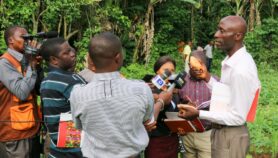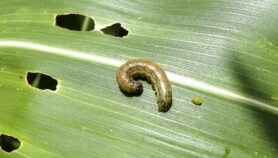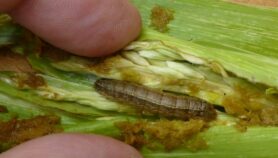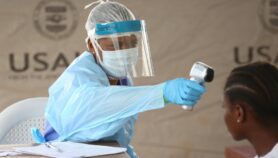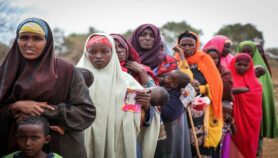Send to a friend
The details you provide on this page will not be used to send unsolicited email, and will not be sold to a 3rd party. See privacy policy.
Below is a roundup of news from or about Sub-Saharan Africa for the period 5–18 May 2011.
Genes from West African cattle may help fight sleeping sickness
Researchers have found two genes that they say could eventually protect cattle against sleeping sickness, a devastating disease spread by the tsetse fly. The findings could also shed light on the human form of the disease, African sleeping sickness. The researchers found the genes in a humpbacked West African cattle breed, N’Dama, which is not seriously affected by the disease. This breed produces less milk than others, and is less docile, so researchers hope that its genetic trait could be combined with traits such as high productivity. More>>
Southern Sudan to improve agricultural research and technology
Improved agricultural research and technology is among measures agreed in a collaboration to transform Southern Sudan’s farms into agribusinesses. The Dutch government; the US Agency for International Development (USAID); the Alliance for a Green Revolution in Africa; and the International Fertilizer Development Center, United States, pledged to develop a commercial agricultural sector for the nation by increasing productivity. Rajiv Shah, USAID’s administrator, said the US government is prepared to sow "hundreds of millions of dollars" into the project. More>>
‘Text message printers’ speed up HIV results
Mozambique’s health ministry is using a wireless phone network to speed up the diagnosis of HIV. Previously, sending off tests — to two central reference laboratories in Maputo — and receiving results took around three weeks. The new method takes only three days on average. Results are entered into a database and uploaded to an online server, which uses a wireless phone network to send results back to clinics. Clinics receive a receipt-like printout of the results with a patient identification number. The technology has been rolled out to more than 275 health centres. More>>
Controversial Obiang prize rejected for second time
UNESCO (the UN Educational, Scientific and Cultural Organisation) has rejected a request to reverse its decision to suspend the UNESCO–Obiang Nguema Mbasogo International Prize for Research in the Life Sciences, named after Equatorial Guinea’s president, Teodoro Nguema Obiang. Last October’s suspension followed an international outcry over Obiang’s dubious human rights record. "With this decision, UNESCO has sent a strong signal to President Obiang that it will not ignore serious human rights and governance concerns," said Tutu Alicante, executive director of civil society organisation EG Justice. More>>
Genetic resources project aims to conserve forests
Forty-three African nations are participating in a project to collect vital knowledge on the status of forest genetic resources. Forest plants provide everything from timber and essential nourishment, when crops fail, to future medicines, said Oudara Souvannavong, project co-ordinator and senior forestry officer at the Food and Agriculture Organization of the United Nations (FAO). "This knowledge is essential if we are to conserve and sustainably manage forests across the globe," he said. The FAO is co-ordinating the project with Bioversity International, the World Agroforestry Centre and the Secretariat of the Convention on Biological Diversity. More>>
Nigeria aims to stem adverse effects of climate change
Nigeria is putting together an action plan for adaptation to climate change. The five-year National Adaptation Strategy and Plan of Action will provide a framework to help reduce risks associated with climate change, and improve local and national adaptive capacity and resilience. It will also help ensure that any strategies put in place are based on knowledge and research, including local knowledge. A draft plan has been presented to stakeholders for discussion. More>>
Zimbabwe’s private sector urged to support ICT projects
The Zimbabwean government has urged the country’s private sector to support and fund information and communications technology (ICT) research, development programmes and centres. "We are struggling to establish communication infrastructure … There is a need for local people and businesses to develop interest and desire to develop local ICT products," said Sam Kundishora, a permanent secretary in the ICT ministry, at a symposium in Harare last week (11 May). The ministry is reviewing the country’s ICT policy. More>>
Rwanda seeks to get students interested in science at early stage
Rwanda is hosting the country’s first ever science exhibition for primary school children, to engage them with science and develop their analytical skills. The Science Village, which will run for three months in Kigali and is expected to attract 40,000 students, encourages pupils to observe, experiment and practice scientific methods. "No effort will be spared to develop science in our country," said Marie Christine Gasingirwa, director of science in Rwanda’s education ministry. Tito Uwiringiyimana, a pupil, said: "I did not know science was this fun". More>>
Compiled by Ochieng’ Ogodo.
If you would like to suggest a story for this news in brief, please contact the Africa News Editor Ochieng’ Ogodo ([email protected]).
This is the final Sub-Saharan Africa news in brief. From the following week it will be replaced with a weekly regional Sub-Saharan Africa news story.




